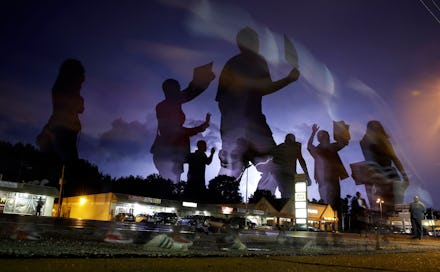One Month After Michael Brown's Murder, Here's What's Happening in Ferguson

30 days later: It's been one month to the day since Officer Darren Wilson murdered 18-year-old Michael Brown in Ferguson, Mo.
While the media coverage has died off significantly, local community members, activists and political figures continue fighting for police reform around one of the more galvanizing civil rights tragedies in recent memory.
In many ways, the town is still recovering from the two weeks of protests that saw over 130 arrests and littered the street with empty tear gas canisters and rubber bullets. While daily life is reacquiring some semblance of normalcy, there are still reminders:
None of the violence that took place has been forgotten, nor will it be:
Victories: Here's what's happening.
Tuesday will see the first public gathering of Ferguson's civic leaders since before Brown's death, according to the Chicago Tribune.
The seven-member City Council, which includes controversial Mayor James Knowles III and Police Chief Tom Jackson, expects a large turnout for what's bound to be a heated exchange of ideas and frustrations following weeks of state-sanctioned brutality against citizens. The last such meeting was planned for August 26, but got cancelled due to the ongoing protests.
The council has also announced the creation of a "citizen review board," which will ostensibly work with police to improve fraught relations with the besieged community.
Plus: One of the key items under discussion is an important legislative change.
The Washington Post, and more recently the New York Times, reported on a devastating tool allegedly used to harass and imprison citizens: Ferguson's system of municipal court fines, which constitutes the city's second-highest revenue source.
Through this system, people — mostly young black men — are routinely passed from one jail to the next on warrants issued for unpaid fines, usually for minor offenses like traffic violations or shoplifting, according to the Times.
As the Times reports, in 2013, Ferguson had 21,135 residents, but issued 24,532 unpaid fine warrants — around three per household, which is the most in the state relative to city size. Traffic fine revenue has increased 44% in Ferguson since 2011, as those who failed to pay fines or show up in court faced new warrants and increased penalties, the Times reports.
This has been a major point of frustration. Critics like community organizer Julia Ho call such measures "a regressive tax on the poor and criminalization of poverty," according to the Times. "If people no longer receive these charges, that's huge: It keeps people from getting stuck in modern debtor's prisons," she said.
As for the proposed change, Ferguson is putting a cap on how much of its revenue can legally be derived from these fines. Currently, it accounts for 20%. The new measure will limit that number to 15%, according to the St. Louis Post-Dispatch.
Despite these positive changes, the elephant in the room still hasn't left: Almost no one in Ferguson has heard a whisper about Officer Darren Wilson's whereabouts since August 9.
The U.S. Department of Justice is also pursuing an investigation into official misconduct by the Ferguson Police. It will specifically focus on the use of excessive force and racial profiling and will incorporate assessments of officer training. The investigation is expected to take months, maybe even years — the department's civil rights probe into Trayvon Martin's murder is still "ongoing," according to the Washington Post.
Regardless, it doesn't assuage the public's cry for accountability for Wilson. Much of their outrage stemmed from officials failing to charge the officer with murdering Brown in the first place.
According to the New York Times, a St. Louis grand jury will make a decision about whether to charge Wilson by next month.
Meanwhile, we wait, and the city of Ferguson continues to fight.